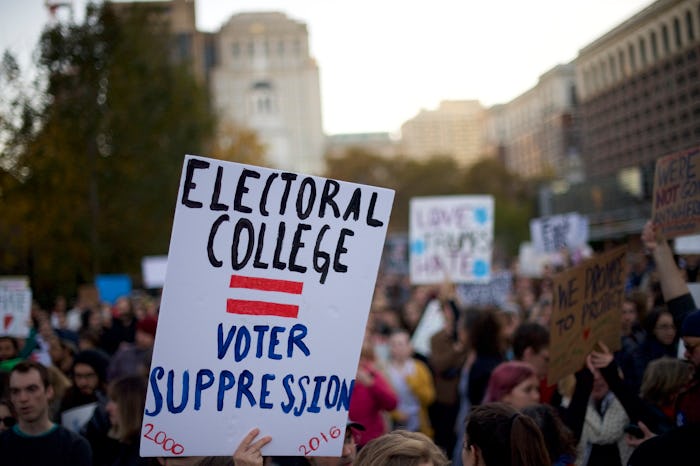News

How Do You Become An Elector? It's An Influential & Crucial Position
The Electoral College process has long been subject to critique, but the recent presidential election has undoubtedly emphasized those criticisms with President-elect Donald Trump's historic win. Hillary Clinton's popular vote has recently been reported as leading in at least 2.8 million votes. But the Electoral College, consisting of 538 electors, determined Trump the winner back in November. On Monday, Dec. 19, the electors will cast an official vote for president. And while electors commonly vote for their party's nominee, many anti-Trump forces are working to encourage electors in states that Trump won to not cast a vote for Trump. So, how do you become an elector anyway? It's clearly an important role.
The 538 electors represent the sum of the United States' 435 Representatives, 100 Senators, and three electors representing D.C. every election. A presidential candidate essentially aims to win 270 electoral votes, which is the majority of electors. When a presidential candidate wins the majority of votes in a state, that candidate is given that state's number of electoral votes. Clinton won a total of 232 electoral votes, compared to Trump's 306. Since Trump's win, there have been a lot efforts to persuade electors in states Trump won to not cast a vote for Trump. Though interestingly, a report published by the Associated Press on Thursday suggested that most of the electors chosen to cast votes in accordance to their party will do so.
So, what's the process to become an elector?
As The Huffington Post reported, the process to select electors varies across states, but they're typically selected by a vote at their state conventions. As published in the U.S National Archives and Records Administration, the process goes as follows:
...The parties either nominate slates of potential Electors at their state party conventions or they chose them by a vote of the party's central committee. This happens in each state for each party by whatever rules the state party and (sometimes) the national party have for the process. This first part of the process results in each Presidential candidate having their own unique slate of potential Electors.
Electors are typically state-elected officials, people with strong personal or political affiliation with their respective party's candidate, or state party leaders, the report explained. And while there's no constitutional or federal law requiring electors to vote according to the popular vote of their state, as U.S National Archives and Records Administration explained, there are varying laws and restrictions on how electors can vote in different states. "Some states, however, require Electors to cast their votes according to the popular vote," the report read.
The electoral vote on Monday will undoubtedly be closely-watched. If enough Republican electors whose state had majority votes for Trump decide not to vote for the president-elect, the election would then go to the House of Representatives.